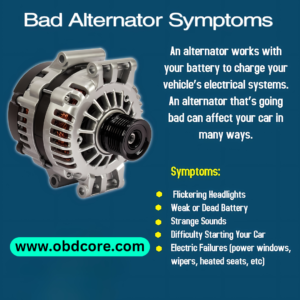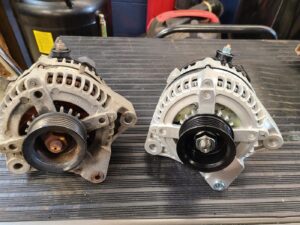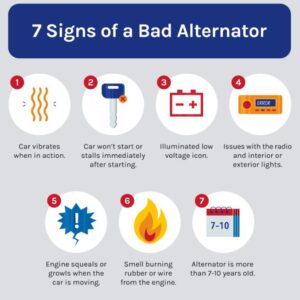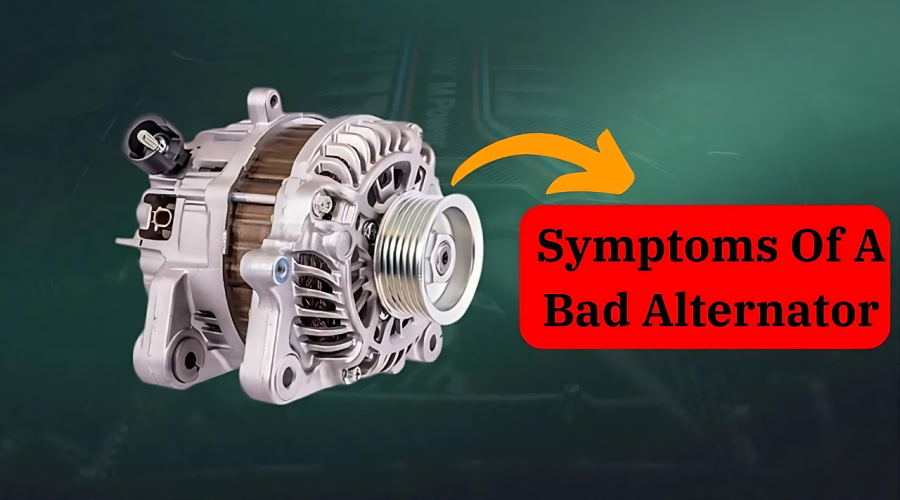Symptoms of a bad alternator include dimming headlights and a weak or dead battery. Your vehicle may also display a battery warning light on the dashboard.
Having a reliable alternator is paramount for any vehicle, as it charges the battery and powers the electrical system while the engine runs. Telltale signs of alternator trouble can creep up unexpectedly, such as electrical components that operate erratically or an engine that struggles to start or suddenly stalls.
These electrical hiccups often lead drivers to suspect battery failure, but the true culprit could be a failing alternator. It’s essential to recognize these indications early to avoid being stranded or facing more costly repairs down the line. Regular maintenance checks can help identify alternator issues before they exacerbate, ensuring that your car’s electrical demands are consistently met and that every journey is smooth and uninterrupted.

Signs Your Car Has A Failing Alternator
An alternator in good health is vital for your car’s performance. It charges the battery and powers the electrical system while your car is running. Noticing symptoms early can save you from a vehicle breakdown. Let’s explore the telltale signs that your alternator might be failing.
Battery Warning Light Illumination
One of the first signs of a failing alternator is the battery warning light on your dashboard. It’s shaped like a battery and might say “ALT” or “GEN”. This light could mean that the alternator isn’t charging the battery. If you see this light, get your alternator checked soon.
Flickering Or Dimming Headlights
Headlights can tell you a lot about the health of your alternator. If they are flickering or dimming, especially when the engine is at idle, this could indicate alternator trouble. Your headlights need a constant power supply which the alternator provides. Notice any changes in light intensity to catch issues early.
Electrical Irregularities And Malfunctions
The symptoms of a bad alternator often manifest as electrical irregularities and malfunctions within your vehicle. The alternator is critical for charging your car’s battery and powering the electrical system. When it fails, you may notice several signs. Let’s delve into these indicators to keep your car’s performance in check.
Dashboard Lights And Accessory Failures
If your alternator is failing, one of the first signs might be unexpected dashboard warning lights. These could include the battery icon or the check engine light. These alerts signal an issue with the vehicle’s charging system.
- Battery light – Indicates potential charging system failure
- Check engine light – May signify alternator-related issues
Additionally, a failing alternator can lead to accessory failures. This is because the alternator might not provide adequate power. Critical accessories such as headlights, infotainment systems, and air conditioning may operate weakly or fail:
| Accessory | Symptom of Failure |
| Headlights | Dimming or flickering |
| Infotainment System | Random shutdowns or malfunctions |
| Air Conditioning | Weaker than normal operation |
Erratic Electrical Components Behavior
Erratic behavior in your vehicle’s electrical components is a telltale sign of alternator trouble. The alternator provides steady electrical energy. If the flow is erratic, it can cause bizarre behavior in various systems:
- Power Windows – Slower operation or stopping midway
- Wipers – Changing speeds or halting unexpectedly
- Radio – Sudden volume changes or power loss
Keep a close watch for these signs. If you notice components not working as they should, or with varying intensity, it’s vital to have your alternator checked. A professional can confirm whether your alternator is the source of the issue.
Under The Hood Symptoms
Keeping an eye on your car’s behavior is key to catching problems early. The alternator is the heart of your vehicle’s electrical system. Knowing the under-the-hood symptoms can save you time and money. Let’s explore the telltale signs of a failing alternator.
Strange Noises From Alternator Area
The alternator should hum smoothly. Listen for odd sounds like whining, grinding, or rattling. These noises suggest internal parts are wearing out. A worn-out bearing could be the culprit. If it’s not fixed soon, the alternator might fail suddenly, leaving you stranded.
Belt And Pulley Inspection Tips
A visual check can reveal much about your alternator’s health. First, ensure the engine is off. Look for the alternator belt on the front of the engine. The belt should be tight and free from cracks. A loose or damaged belt prevents the alternator from charging properly. Move on to the pulleys. They should be free from damage and spin freely. Misaligned pulleys put extra strain on the alternator, leading to premature failure.
Checking under the hood regularly keeps your car reliable. Pay attention to these symptoms to avoid a dead battery or worse. Keeping up with maintenance can extend the life of your car’s alternator and electrical system.
Battery Performance And Charging Issues
When your car’s alternator starts to fail, your battery suffers most. The alternator’s job is to charge the battery while your car is running. If it’s damaged, you’ll notice some tell-tale signs related to the battery performance and charging.
Difficulty Starting The Vehicle
A car that’s hard to start could be giving you an early warning of alternator trouble. With a bad alternator, the battery does not get enough charge and struggles to provide the starter motor the power it needs. Watch for this red flag especially if your car starts fine sometimes, and struggles at others.
Battery Dies Quickly Or Doesn’t Hold Charge
If your battery seems to die too fast or can’t hold a charge, don’t rush to blame the battery itself. It could actually be your alternator not doing its job. A healthy alternator is key for a charged and happy battery.Here are some Best Battery that might be solve your problem.
| Sign | Possible Cause |
| Car takes multiple tries to start | Poor alternator output |
| Need to jump-start often | Battery not charging sufficiently |
| Lights dimming at idle | Alternator failing to maintain power flow |
Troubleshooting Alternator Problems
Identifying issues with a car’s alternator demands careful attention to details. An alternator is vital for powering the vehicle and recharging the battery. Learning to troubleshoot these problems can save time and prevent larger issues.
Voltage And Output Tests
Conducting voltage and output tests is a quick method to assess alternator health. Use a multimeter to check the voltage across the battery terminals. With the engine off, expect around 12.6 volts. With the engine running at about 2000 RPM, expect between 13.7 and 14.7 volts. Significant deviations suggest a failing alternator.
For a more thorough check, measure alternator output with an ammeter. This reveals if the alternator meets the electrical load demands of your car. Low readings indicate a problem.
Visual Inspection Of Wires And Connections
A visual inspection can reveal much about an alternator’s condition. Check for:
- Loose wires which can cause intermittent charging issues
- Corroded or damaged connections, hindering electricity flow
- Signs of wear on the belt driving the alternator
- Physical damage to the alternator itself
Ensuring all connections are secure and free of corrosion is crucial. Replace worn belts to maintain proper alternator function.
Consequences Of Ignoring Alternator Warning Signs
The health of your vehicle’s alternator is integral to its smooth function. Ignoring signs of a faltering alternator can lead to unexpected and inconvenient consequences. Beyond the hassle of a car that won’t start, the ripple effects of alternator neglect can extend to other vehicle components, leading to costly repairs and unsafe driving conditions. Recognizing and addressing issues early can sidestep these pitfalls.
Potential For A Breakdown
The risk of getting stranded is real when alternator warnings are overlooked. A bad alternator means your car might stop unexpectedly and anywhere. This leads to safety concerns, especially if the vehicle ceases to function on busy roads or in remote areas. Quick response to alternator symptoms is crucial for avoiding such breakdowns.
Long-term Battery And Electrical Damage
Prolonged exposure to a failing alternator takes a toll on the battery and electrical system. The alternator’s role is to charge the battery; if it fails, the battery also suffers, leading to diminished capacity and shortened lifespan. Furthermore, other electrical components like the headlights, dashboard lights, and radio could behave erratically or fail, due to inconsistent power supply.
| Component | Effect of Bad Alternator |
| Battery | Quick drain, unable to hold charge |
| Electrical System | Unreliable operation, potential failure |
| Overall Vehicle Health | Increased wear and tear, higher repair costs |
- Address alternator issues promptly to avert battery damage.
- Maintain vehicle’s electrical integrity to ensure safe operation.
- Consult a professional immediately upon noticing alternator symptoms.
The Interplay Between The Alternator And Battery
Your car relies on teamwork. The alternator and battery work together like best friends. The battery starts your car. The alternator keeps everything running and charges the battery.You can recharge A car battery with A Jump Starter.If one fails, the other suffers. Understand how a bad alternator affects your car’s performance and battery life.
How A Failing Alternator Affects Battery Life
A weak alternator leads to a weak battery. It’s simple. The alternator recharges the battery while you drive. If it’s struggling, your battery gets tired. Soon, your car won’t start.
- Dim lights: Interior and headlights may flicker or dim.
- Slow accessories: Power windows and others may slow down.
- Warning light: Your dashboard might flash a battery sign.
Balancing Charging And Power Supply
The alternator multitasks. It charges the battery and powers car systems. It’s all about balance. If this balance tips, problems begin.
| Function | Impact of Failure |
| Charging | Battery drains, potentially dying completely. |
| Power Supply | Electrical systems like AC and radio may cut out. |
A balanced system means a happy, long-lasting car. Keep an eye out for changes in electrical performance. It could save you from getting stranded. Regular care keeps your car reliable.
Repair And Replacement Considerations
Diagnosing a bad alternator can lead to important decisions. Your vehicle’s health hinges on whether you repair or replace this vital component. Each choice has its merits, challenges, and cost implications.
When To Choose Repair Over Replacement
In some cases, repairing an alternator can be a wise choice.
- Age of Vehicle: If your vehicle is relatively new, repairing might be enough.
- Extent of Damage: Minor wear may only require simple, cost-effective fixes.
- Quality of Alternator: High-quality units often warrant a repair job over full replacement.
Remember, a professional diagnosis is critical to determine the issue.
What To Expect When Replacing Your Alternator
Replacing your alternator is a straightforward process but involves some steps.
- Turn off your vehicle and disconnect the battery.
- Remove the serpentine belt and other connections to the alternator.
- Extract the old alternator and replace it with a new one.
- Reconnect all elements and make sure they fit properly.
- Test the electrical system to ensure proper installation.
Expect to invest in both parts and labor. Choose a reliable service provider for best results.
Preventative Maintenance Tips
Preventative Maintenance Tips keep your vehicle’s alternator running smoothly. Spot signs of wear early. Tackle them before they become major issues. Stay on the road with a reliable power supply. Implement these checks and practices.
Routine Check-ups And Diagnostics
Regular inspections are essential. Look at the alternator during each oil change. Check the drive belt for cracks, fraying, or glazing. Listen for unusual noises. Test voltage output with a multimeter. A reading between 13.8 and 14.2 volts is ideal. Look for dashboard warning lights, such as the battery light, that may indicate issues.
Here’s a table listing the recommended frequency for alternator check-ups:
| Vehicle Type | Check-up Frequency |
| Passenger Cars | Every oil change or 6,000 miles |
| Heavy-Duty Vehicles | Every 3,000 miles |
Lifespan Maximization Strategies
To prolong your alternator’s life, follow these steps:
- Turn off accessories like the radio or A/C before starting the car.
- Avoid running electronics while idling. It strains the alternator.
- Keep the battery clean and tight to prevent overworking the alternator.
- Replace the alternator belt before it breaks.
Implementing these tips will save you time and money. Keep your alternator healthy. Enjoy uninterrupted journeys.


Frequently Asked Questions On Symptoms Of A Bad Alternator
What Are Common Signs Of Alternator Problems?
A faulty alternator often manifests through dimming lights, electrical issues, and a dead battery. If you notice flickering headlights or a sluggish engine start, these could be telltale signs. Regular servicing can catch these early.
How Does A Bad Alternator Affect My Car?
A bad alternator can lead to poor battery charging, resulting in frequent jump-starts or replacements. Your vehicle may experience power fluctuations impacting the performance of electronic components and potentially causing a breakdown.
Can A Bad Alternator Be Dangerous?
Yes, a failing alternator poses safety risks. It can cause sudden loss of power or complete electrical failure while driving, which could lead to critical situations, especially at night or on busy roads.
What Does Alternator Failure Sound Like?
Alternator failure is often accompanied by unusual noises such as whining, growling, or grinding sounds. These noises result from worn-out bearings or internal parts within the alternator struggling to function properly.
Conclusion
Recognizing the warning signs of a failing alternator is essential for vehicle maintenance. Dim lights, electrical issues, and a dead battery can all point to this problem. Regular checks will prevent sudden breakdowns. Don’t hesitate to consult a mechanic if these symptoms appear, ensuring your car remains reliable on the road.

